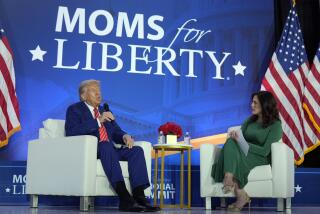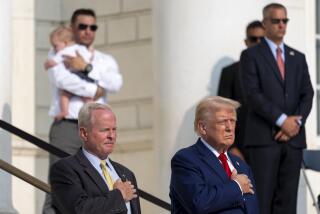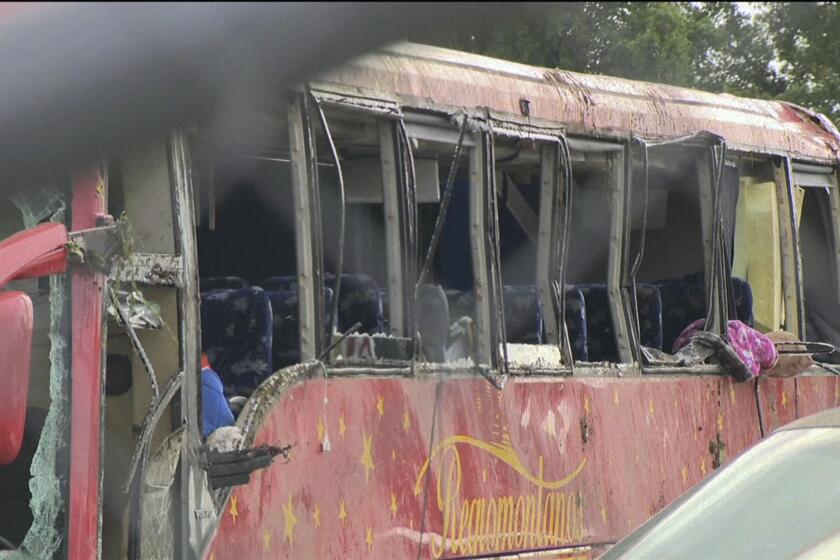CRISIS IN THE KREMLIN : Several Experts Say Coup Raised Scary Questions on Nuclear Controls : Military: Plotters in the junta are believed to have had all the launch codes.
In a scenario that smacked of spy thrillers, the recent coup in the Soviet Union raised frightening questions about who was in charge of the codes that could launch almost half of the world’s nuclear arsenal.
A leading Soviet space scientist and several top American experts contend that the highly centralized and automated Soviet command and control system was at risk during the coup.
For the record:
12:00 a.m. Aug. 23, 1991 For the Record
Los Angeles Times Friday August 23, 1991 Home Edition Part A Page 3 Column 5 Metro Desk 2 inches; 68 words Type of Material: Correction
Soviet Coup--A Thursday story about control of Soviet nuclear weapons stated that Gen. Mikhail A. Moiseyev, army chief of staff, supported the recent coup. While some independent Moscow reports had Moiseyev among the supporters, that has not been established. President Mikhail S. Gorbachev, in appointing Moiseyev defense minister Thursday, said that he was not a coup supporter. Senior Bush Administration officials said they had received conflicting reports on the question.
“It’s the first time in human history when organizers of a coup could also seize the buttons that control the weapons of mass destruction,” said Roald Z. Sagdeyev, the former director of the Soviet space program and a leading Soviet arms expert.
Sagdeyev, interviewed by phone in Washington, where he is teaching, said that Soviet strategic weapons can be launched by the military chief of staff, merging two sets of codes that were in the possession of President Mikhail S. Gorbachev and Defense Minister Dmitri T. Yazov at the time of the coup.
Both Gen. Mikhail A. Moiseyev, the chief of staff, and Yazov supported the coup. Sagdeyev and others believe it is likely that the coup leaders obtained Gorbachev’s codes, setting up the possibility of an irrational or chaotic leadership controlling a highly centralized launch system.
The coup leaders “might not be the unitary, rational decision-makers that we always imagine exists in all our concepts of (nuclear) deterrence,” said Bruce Blair, an arms control expert at the Brookings Institute. “The greatest risk is a breakdown of control and rational decision-making at the top.”
“Usually, one worries about the loss of control of nuclear weapons from below by terrorists stealing a bomb or the taking over of a forward post by a mad battery commander,” said Stanford’s Wolfgang Panofsky, a veteran arms control expert. The coup, he said, posed a different problem: loss of control at the top.
“The whole concept of deterrence does assume a responsible leadership. If the top leadership becomes desperate, there are no safeguards in any country,” he said.
Unlike the American system, the Soviets rely on a centralized, automatic launch control system for many of their newest strategic weapons. The Soviets “went fairly overboard with their infatuation with automation during the early ‘80s, designing a system that allowed the top decision-makers to bypass the entire chain of command and to fire unmanned strategic forces out of their silos, or from their mobile launch pad directly by remote command,” Blair said.
The Soviets liked the centralized approach because it retained control over nuclear weapons at the center of political decision-making. But such a system also is far more vulnerable to irrational leadership decisions because it enables those in possession of the launching codes to directly fire the weapons, bypassing intermediary human decision-making.
Upgrading the state of command and control has been a concern of both U.S. and Soviet experts. Panofsky is a member of a joint panel of Soviet and American experts who met last June at Strategic Air Command headquarters in Omaha to deal with problems of command and control of the nuclear arsenal on both sides.
Three years ago, Sagdeyev wrote a letter to Moiseyev suggesting that U.S. and Soviet experts work more closely on improving command and control, but he was turned down. Sagdeyev said Wednesday that he was concerned then and now over the poor state of the Soviet system and even urged the United States to send more sophisticated computers to the Soviets to improve reliability because “stable deterrence requires complicated electronic hardware and computers, and the technology on the Soviet side was coming from the Stone Age.”
Sagdeyev expressed great concern over the ability of Soviet leadership to perform the intricate rituals of deterrence during the coup, including accurate assessment of any nuclear threat picked up on radar and satellite pictures.
Sagdeyev agreed with other experts that the danger of use of tactical nuclear weapons was less than with the strategic force. In the Soviet tactical arsenal, the warhead is not generally stored within easy access of the launcher, and even the strategic bomber force generally flies without its nuclear weapons aboard.
An interview with Roald Z. Sagdeyev will appear in Sunday’s Opinion section.
More to Read
Sign up for Essential California
The most important California stories and recommendations in your inbox every morning.
You may occasionally receive promotional content from the Los Angeles Times.






